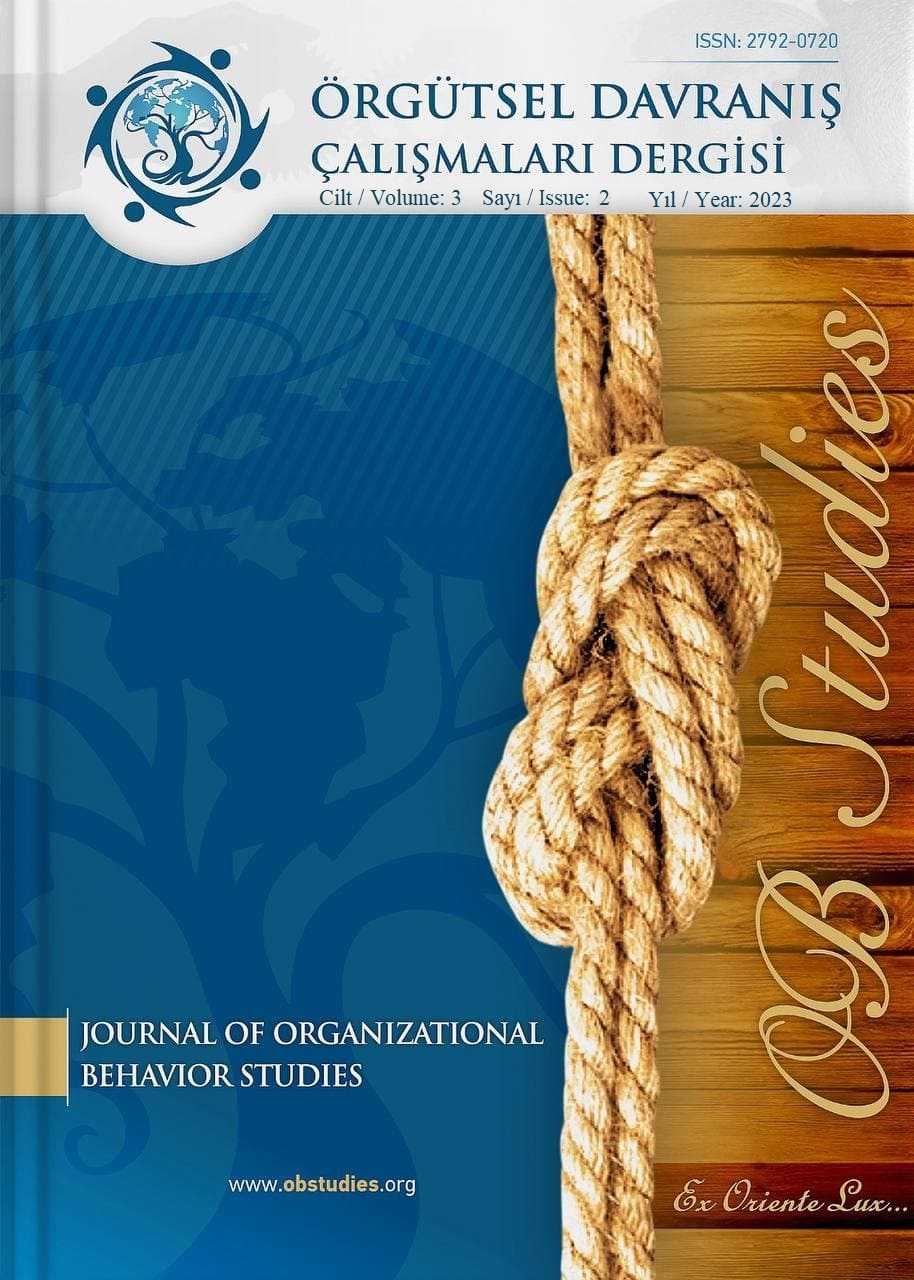POWER AND POLITICS IN ORGANIZATIONS: A REVIEW OF PFEFFER’S TYPOLOGY
Keywords:
Organizational Politics, Organizational Power, Pfeffer, Power, PoliticsAbstract
In order for organizations to achieve their goals, members of the organization face many cases when they need to make decisions in line with the organizational goals. Power relations in the organization and political behaviors arising from the transformation of these relations into actions affect the decisions taken informally, although not at the formal level. Therefore, power and politics in organizations is an issue that needs to be addressed. The aim of this study is to draw the theoretical framework of organizational power and politics from the perspective of Pfeffer. In this context, firstly, the concepts of power and organizational power are defined within the framework of Pfeffer’s typology. Then, in order to better understand where power comes from, when power emerges in an organization is examined and the sources of power are discussed. Then, the power tactics used by both subordinates and superiors in the organization were emphasized and power management, which is necessary for power to be effective and not to get out of control, was explained in detail. After discussing power and organizational power, the concepts of politics and organizational politics were explained by revealing when power turns into politics. Then, the political tactics employed in organizations were discussed. Finally, the ways of combating political behaviors were explored in order to prevent political behaviors from harming the organization. The study data on Pfeffer’s typology was collected through literature review based on primary and secondary sources.
References
Aldrich, H. E., & Pfeffer, J. (1976). Environments of organizations. Annual Review of Sociology, 2(1), 79-105.
Altınkurt, Y., Yılmaz, K., Erol, E. & Salalı, E. T. (2014). Okul müdürlerinin kullandığı güç kaynakları ile öğretmenlerin örgütsel sinizm algıları arasındaki ilişki. Journal of Teacher Education and Educators, 3(1), 25-52.
Altınkurt, Y. & Yılmaz, K. (2013). Okullarda Örgütsel Güç Ölçeği'nin geliştirilmesi: Geçerlik ve güvenirlik çalışması. International Journal of Educational Research, 4(4), 1-17.
Aydın, Ş. ve Coşkun, R. (2007). Örgütsel güce ilişkin eleştirel bir çözümleme. Akademik İncelemeler Dergisi, 2(2), 97-128.
Bakan, İ. & Büyükbeşe, T. (2010). Liderlik türler ve güç kaynaklarına ilişkin mevcut-gelecek durum karşılaştırması. Karamanoğlu Mehmetbey Üniversitesi Sosyal ve Ekonomik Araştırmalar Dergisi, 2010(2), 73-84.
Bayrak, S. (2001). Yönetimde bir ihmal konusu olarak güç ve güç yönetimi-II. Süleyman Demirel Üniversitesi İktisadi ve İdari Bilimler Fakültesi Dergisi, 6(1), 23-42.
Camm, T. W. (2013). Power and politics in organizations. Mining Engineering. Paper 1.
Erdoğan, B. (1997). Örgütsel Güç ve Politika. Yönetim, 8(26), 21-31.
French, J. R., Raven, B. & Cartwright, D. (1959). The bases of social power. Classics of Organization Theory, 7.
Fulop, L., Linstead, S. & Frith, F. (1999). Power and politics in organizations. In Management (pp. 122-158). Macmillan Education UK.
Gordon, R. (2009). Power and legitimacy: From Weber to contemporary theory. The Sage handbook of power, 256-273.
Helvacı, M. A. & Kayalı, M. (2011). Okul müdürlerinin kullandıkları örgütsel güç kaynaklarının bazı değişkenler açısından incelenmesi (Uşak ili örneği). Mehmet Akif Ersoy Üniversitesi Eğitim Fakültesi Dergisi, 1(22), 255-279.
Koçel, T. (2010). İşletme yöneticiliği. (12. Baskı). İstanbul: Beta Yayınları.
Koşar, S. & Çalık, T. (2011). Okul yöneticilerinin yönetimde gücü kullanma stilleri ile örgüt kültürü arasındaki ilişki. Kuram ve Uygulamada Eğitim Yönetimi Dergisi, 17(4), 581-603.
Nelson, D.L. & Quick, J. C. (2011). Organizational behaviour: Science, the real world and you. (seventh edition) Mason: Cengage Learning.
Oade, A. (2009). Managing politics at work. New York: Macmillan.
O’Reilly, C. A., & Pfeffer, J. (2021). Organizational power and politics: The narcissist's advantage?. Personality and Individual Differences, 182, 111061.
Özaslan, G. (2006). Eğitim yöneticilerinin güç tipi tercihlerinin değerlendirilmesi. Yayımlanmamış Yüksek Lisans Tezi. Selçuk Üniversitesi Sosyal Bilimler Enstitüsü, Konya.
Özcan, K., Karatas, I. H., Çağlar, Ç. & Polat, M. (2014). Administrators' power usage styles and their impact on the organizational culture in colleges of education: A case study. Educational Sciences: Theory and Practice, 14(2), 560-569.
Özkalp, E. (2006). Örgütsel davranış. (3. Baskı). Eskişehir: Anadolu Üniversitesi Yayınları.
Pfeffer, J. (1992). Managing with power: Politics and influence in organizations. Harvard Business Press.
Pfeffer, J. (2010). Power: Why some people have it—And others don’t. NY: Harper Business.
Salancik, G. R., & Pfeffer, J. (1974). The bases and use of power in organizational decision making: The case of a university. Administrative Science Quarterly, 453-473.
Salancik, G. R., & Pfeffer, J. (1989). Who gets power and how they hold on to it: A strategic-contingency model of power. Readings in Managerial Psychology, 346-366.
Titrek, O. & Zafer, D. (2009). İlköğretim okulu yöneticilerinin kullandıkları örgütsel güç kaynaklarına ilişkin öğretmen görüşleri. Kuram ve Uygulamada Eğitim Yönetimi, 60(60), 657.

Downloads
Published
How to Cite
Issue
Section
License
Copyright (c) 2023 Journal of Organizational Behavior Studies

This work is licensed under a Creative Commons Attribution-NonCommercial-NoDerivatives 4.0 International License.
Accepted 2023-12-23
Published 2023-12-31




